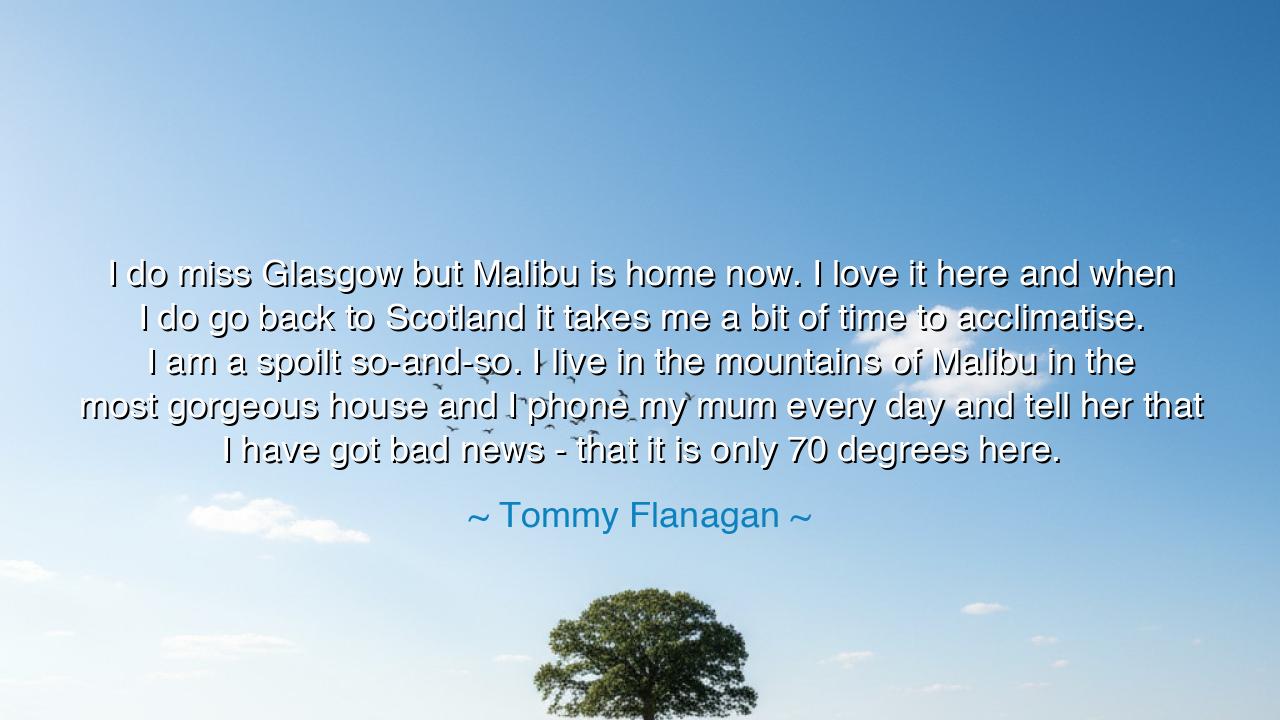
I do miss Glasgow but Malibu is home now. I love it here and when
I do miss Glasgow but Malibu is home now. I love it here and when I do go back to Scotland it takes me a bit of time to acclimatise. I am a spoilt so-and-so. I live in the mountains of Malibu in the most gorgeous house and I phone my mum every day and tell her that I have got bad news - that it is only 70 degrees here.






In the words of Tommy Flanagan, “I do miss Glasgow but Malibu is home now. I love it here and when I do go back to Scotland it takes me a bit of time to acclimatise. I am a spoilt so-and-so. I live in the mountains of Malibu in the most gorgeous house and I phone my mum every day and tell her that I have got bad news — that it is only 70 degrees here.” These words, though wrapped in humor, carry the deep echo of a timeless truth — the pull between home and exile, between the land of one’s birth and the place of one’s becoming. They speak of gratitude, of distance, of longing softened by laughter. Beneath their warmth lies the ancient ache of all who have left one shore to find another.
For every soul that journeys far from its roots must one day face this tender paradox: that the heart is a traveler, yet it never fully departs from where it began. Flanagan’s words reflect the old wisdom that a man may cross oceans and climb mountains, but within him, his homeland endures. He loves his new life beneath the Californian sun, yet the mist and stone of Scotland whisper in his memory. The body may dwell in Malibu, but the spirit keeps a small cottage in Glasgow, where the wind carries the scent of rain and the voice of his mother still lingers. Such is the dual life of the wanderer — rich in horizons, yet haunted by the soil that first knew his footsteps.
In the ancient world, Odysseus knew this same longing. Though he feasted in the palaces of foreign kings and beheld wonders across the sea, his heart yearned always for Ithaca, for the hearth where Penelope waited and the olive tree that marked his youth. Like Odysseus, Flanagan speaks from a place of triumph — the mountaintops of Malibu, the land of light and luxury — yet he remembers the rough beauty of his homeland with reverence. His jest to his mother, that it is “only 70 degrees,” hides affection in irony. It is a son’s playful way of saying: I have everything I dreamed of, yet part of me still belongs to where you are.
The origin of his words is rooted not in complaint, but in gratitude and humility. He acknowledges that he is “spoilt,” not in vanity, but in awareness. He knows his good fortune — the comfort, the success, the beauty around him — and does not let it harden into pride. Instead, he tempers joy with remembrance, luxury with longing. This is an ancient virtue: to dwell in prosperity and yet not forget simplicity; to hold abundance with open hands. For the wise know that home is not merely where one lives, but where one’s soul was first shaped by love and struggle.
In these words also lies the reminder that the heart adapts, but never fully forgets. When Flanagan says it takes time to “acclimatise” upon returning to Scotland, he speaks of more than weather. He speaks of rhythm — the pace of life, the quiet humility of familiar streets, the sound of rain that once was ordinary but now feels foreign. Yet in this adjustment lies the beauty of the human spirit: its power to belong to many worlds at once. To leave home and still love it, to embrace the new without betraying the old — this is the mark of one who has grown in both fortune and wisdom.
Consider also the tale of Marcus Aurelius, the Roman emperor-philosopher, who led armies across the frozen frontiers of the empire, yet wrote his Meditations under the gray skies of exile. He lived among tents and soldiers, far from the marble halls of Rome, yet found peace in remembering the simple virtues of his teachers and family. Like Flanagan, he learned that home is not always a place — it is the compass of the heart, guiding us through every change of sky and soil. The wise do not curse their distance from home; they carry home within them.
Thus, the lesson of Flanagan’s reflection is one of balance and remembrance. Love the life you have built — the sunlight, the comfort, the abundance — but never lose reverence for the soil that raised you. Speak to your elders, as he does to his mother; tell them of your joys with humility and laughter. Let gratitude be the bridge between past and present. Do not boast of where you live, but honor where you came from. For the man who remembers his beginnings, even in triumph, remains whole.
And so, my children, take this wisdom to heart: when life carries you to distant lands or higher peaks, do not forget the valley where your journey began. Call home, even if only to say, as Flanagan did with a smile, that the sun shines warmly and the heart still remembers the rain. For one day, when the road winds back, you will find that home never left you — it was carried all along in your laughter, your gratitude, and your love.






AAdministratorAdministrator
Welcome, honored guests. Please leave a comment, we will respond soon